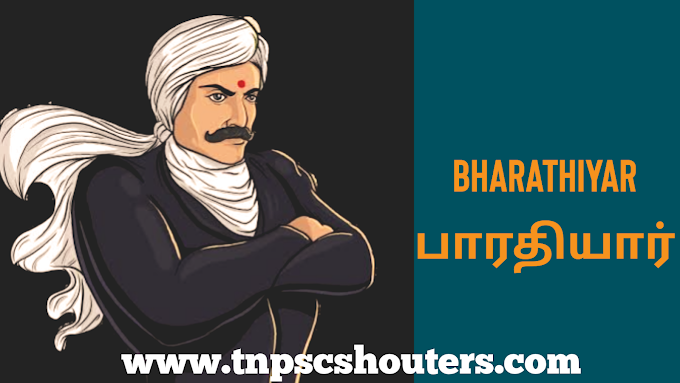ONLINE TEST TOPIC :
1. UNIT - I : GENERAL SCIENCE ONLINE TEST
2. UNIT
- II: CURRENT EVENTS -->> ONLINE TEST
3. UNIT - III: ONLINE TEST GEOGRAPHY OF INDIA
4. UNIT
– IV: ONLINE TEST HISTORY AND CULTURE OF INDIA
5. UNIT
- V: ONLINE TEST INDIAN POLITY
6. UNIT
- VI: ONLINE TEST INDIAN ECONOMY
7. UNIT- VII: ONLINE TEST INDIAN NATIONAL MOVEMENT
8. UNIT - VIII : ONLINE TEST HISTORY, CULTURE,
HERITAGE AND SOCIO – POLITICAL MOVEMENTS IN TAMIL NADU(POTHU TAMIL STUDY
MATERIAL PDF)
9. UNIT– IX : ONLINE TEST DEVELOPMENT ADMINISTRATION IN TAMIL NADU
GROUP 2 AND GROUP 2A STUDY MATERIAL DOWNLOAD: 2020
 |
- Scientific Knowledge and Scientific temper – Power of Reasoning – Rote Learning Vs Conceptual Learning – Science as a tool to understand the past, present and future.
- Nature of Universe – General Scientific Laws – Mechanics – Properties of Matter, Force, Motion and Energy – Everyday application of the basic principles of Mechanics, Electricity and Magnetism, Light, Sound, Heat, Nuclear Physics, Laser, Electronics and Communications.
- Elements and Compounds, Acids, Bases, Salts, Petroleum Products, Fertilizers, Pesticides.
- Main concepts of Life Science, Classification of Living Organisms, Evolution, Genetics, Physiology, Nutrition, Health and Hygiene, Human diseases.
- Environment and Ecology.
UNIT - II: CURRENT EVENTS -->> ONLINE TEST
- History – Latest diary of events – National symbols – Profile of States – Eminent personalities and places in news – Sports – Books and authors.
- Polity – Political parties and political system in India – Public awareness and General administration – Welfare oriented Government schemes and their utility, Problems in Public Delivery Systems.
- Geography – Geographical landmarks.
- Economics – Current socio – economic issues.
- Science – Latest inventions in Science and Technology.
- Location – Physical features – Monsoon, rainfall, weather and climate – Water resources – Rivers in India – Soil, minerals and natural resources – Forest and wildlife – Agricultural pattern.
- Transport – Communication.
- Social geography – Population density and distribution – Racial, linguistic groups and major tribes.
- Natural calamity – Disaster Management – Environmental pollution: Reasons and preventive measures – Climate change – Green energy.
UNIT – IV: HISTORY AND CULTURE OF INDIA
- Indus valley civilization – Guptas, Delhi Sultans, Mughals and Marathas – Age of Vijayanagaram and Bahmani Kingdoms – South Indian history.
- Change and Continuity in the Socio – Cultural History of India.
- Characteristics of Indian culture, Unity in diversity – Race, language, custom.
- India as a Secular State, Social Harmony.
- Constitution of India – Preamble to the Constitution – Salient features of the Constitution – Union, State and Union Territory.
- Citizenship, Fundamental rights, Fundamental duties, Directive Principles of State Policy.
- Union Executive, Union legislature – State Executive, State Legislature – Local governments, Panchayat Raj.
- Spirit of Federalism: Centre – State Relationships.
- Election – Judiciary in India – Rule of law.
- Corruption in public life – Anti-corruption measures – Lokpal and LokAyukta – Right to Information – Empowerment of women – Consumer protection forums, Human rights charter.
UNIT - VI: INDIAN ECONOMY
- Nature of Indian economy – Five year plan models – an assessment – Planning Commission and Niti Ayog.
- Sources of revenue – Reserve Bank of India – Fiscal Policy and Monetary Policy – Finance Commission – Resource sharing between Union and State Governments – Goods and Services Tax.
- Structure of Indian Economy and Employment Generation, Land reforms and Agriculture – Application of Science and Technology in agriculture – Industrial growth – Rural welfare oriented programmes – Social problems – Population, education, health, employment, poverty.
UNIT - VII: INDIAN NATIONAL MOVEMENT
UNIT - VII: ONLINE TEST INDIAN NATIONAL MOVEMENT
- National renaissance – Early uprising against British rule – Indian National Congress – Emergence of leaders – B.R.Ambedkar, Bhagat Singh, Bharathiar, V.O.Chidambaranar, Jawaharlal Nehru, Kamarajar, Mahatma Gandhi, Maulana Abul Kalam Azad, Thanthai Periyar, Rajaji, Subash Chandra Bose and others.
- Different modes of Agitation: Growth of Satyagraha and Militant movements.
- Communalism and partition.
UNIT - VIII : History, Culture, Heritage and Socio – Political Movements in Tamil Nadu(POTHU TAMIL STUDY MATERIAL PDF)
- History of Tamil Society, related Archaeological discoveries, Tamil Literature from Sangam age till contemporary times.
- Thirukkural - Significance as a Secular literature, Relevance to Everyday Life, Impact of Thirukkural on Humanity, Thirukkural and Universal Values – Equality, Humanism, etc, Relevance to Socio – Politico-Economic affairs, Philosophical content in Thirukkural
- Role of Tamil Nadu in freedom struggle – Early agitations against British Rule – Role of women in freedom struggle.
- Evolution of 19th and 20th Century Socio-Political movements in Tamil Nadu – Justice Party, Growth of Rationalism – Self Respect Movement, Dravidian movement and Principles underlying both these movements, Contributions of Thanthai Periyar and Perarignar Anna.
UNIT – IX : Development Administration in Tamil Nadu
- Human Development Indicators in Tamil Nadu and a comparative assessment across the Country – Impact of Social Reform movements in the Socio – Economic Development of Tamil Nadu.
- Political parties and Welfare schemes for various sections of people – Rationale behind Reservation Policy and access to Social Resources – Economic trends in Tamil Nadu – Role and impact of social welfare schemes in the Socio – economic development of Tamil Nadu.
- Social Justice and Social Harmony as the Cornerstones of Socio – Economic development.
- Education and Health systems in Tamil Nadu.
- Geography of Tamil Nadu and its impact on Economic growth.
- Achievements of Tamil Nadu in various fields.
- e-governance in Tamil Nadu.
UNIT - X: APTITUDE AND MENTAL ABILITY
- Simplification – Percentage – Highest Common Factor (HCF) – Lowest Common Multiple (LCM).
- Ratio and Proportion.
- Simple interest – Compound interest – Area – Volume – Time and Work.

















